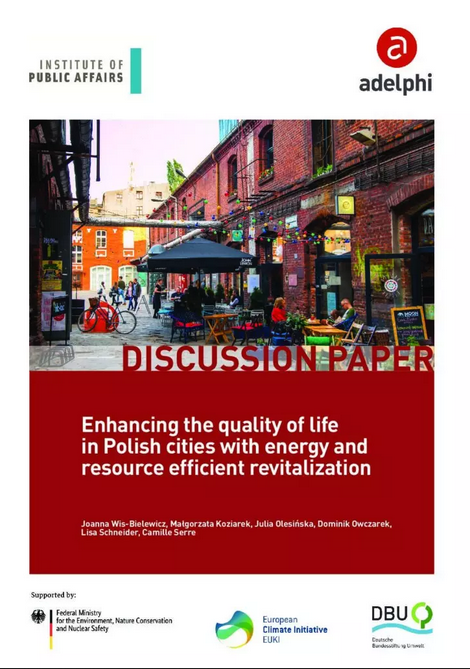REVIPOWER – Energy and Resource Efficient Neighbourhood Renewals in Polish Cities
The project is completed. The overall goal of the project was to unleash the transformative potential of renewal efforts that was developed under the National Revitalisation Law and as well as local revitalisation plans by making them more sustainable, especially in regard to resource efficiency.
Energy Efficiency Energy Policy Energy Transition and Climate-Neutral Buildings

Project info
Poland
09/17 - 03/19
Local governments, National governments, Media, Non-governmental organisations
155,235.00 €
Contact info
Johanna Wis-Bielewicz
-
Project
adelphi and the partner organisations IPA, PNEC and IWO e.V. have put sustainable development and energy efficiency at the heart of the debate on revitalisation in Poland. Further project partners designed and tested the innovative modular and “open source” training concept REVIPOWER for and together with Polish municipal authorities and key actors from local and regional organisations. Together with experts from Germany and Poland, the participants from municipalities and local and regional actors developed the training modules. A more participative approach was being used instead of the traditional separation between teachers and trainees. The thematic modules were structured by considering the socio-economic priorities of the Polish participating municipalities. The goal was to overcome the usual sectoral approach and to tap into the potential of cross-cutting approaches for the revitalisation efforts. Ultimately, the training material empowered participants to act as multipliers and to spread the acquired knowledge in their networks, thereby contributing to the mainstreaming of sustainable neighbourhood revitalisation.
Background
As part of the European Cohesion policy 2014 – 2020, Polish municipalities received nearly EUR 6 billion in structural support for revitalisation efforts through national and regional programmes. The Partnership Agreement signed between Poland and the European Commission defines sustainable development (incl. energy- and resource efficiency) as horizontal criteria. The low-emission transition, air pollution challenges, and energy efficiency, although mentioned in major Polish strategic documents, were however not included in the debate and implementation of revitalisation efforts in Poland. The lack of prominence and concrete provisions for energy- and resource efficiency may lock Polish cities into unsustainable development patterns and infrastructure.
State of Results
- A discussion paper “Enhancing the quality of life in Polish cities with energy and resource efficient revitalization”, including experiences from Germany and other Central and Eastern European countries, was published in Polish and English and made available to a broad professional public.
- More than 300 local, regional and national political decision-makers and non-governmental organizations strengthened their awareness towards the advantages of energy- and resource-saving neighborhood rehabilitation through workshops, conferences and round-table discussions.
- 57 representatives of municipalities and other local stakeholders have participated in training activities on the multi-dimensionality of energy- and resource-efficient revitalization measures and learned about practical solutions for their planning and implementation.
Last update: July 2024

